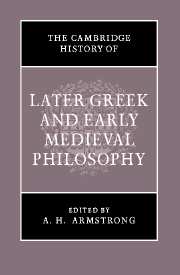Book contents
- Frontmatter
- Chapter 1 Introductory
- Part 1 GREEK PHILOSOPHY FROM PLATO TO PLOTINUS
- Part II PHILO AND THE BEGINNINGS OF CHRISTIAN THOUGHT
- Chapter 8 Philo
- Chapter 9 The beginning of Christian philosophy: Justin: the Gnostics
- Chapter 10 Clement of Alexandria
- Chapter 11 Origen
- Part III PLOTINUS
- Part IV THE LATER NEOPLATONISTS
- Part V MARIUS VICTORINUS AND AUGUSTINE
- Part VI THE GREEK CHRISTIAN PLATONIST TRADITION FROM THE CAPPADOCIANS TO MAXIMUS AND ERIUGENA
- Part VII WESTERN CHRISTIAN THOUGHT FROM BOETHIUS TO ANSELM
- Part VIII EARLY ISLAMIC PHILOSOPHY
- Select Bibliography
- Additional Notes and Bibliography
- Index of ancient and medieval works referred to in the text
- General Index
- Index of Greek terms
- References
Chapter 10 - Clement of Alexandria
from Part II - PHILO AND THE BEGINNINGS OF CHRISTIAN THOUGHT
Published online by Cambridge University Press: 28 March 2008
- Frontmatter
- Chapter 1 Introductory
- Part 1 GREEK PHILOSOPHY FROM PLATO TO PLOTINUS
- Part II PHILO AND THE BEGINNINGS OF CHRISTIAN THOUGHT
- Chapter 8 Philo
- Chapter 9 The beginning of Christian philosophy: Justin: the Gnostics
- Chapter 10 Clement of Alexandria
- Chapter 11 Origen
- Part III PLOTINUS
- Part IV THE LATER NEOPLATONISTS
- Part V MARIUS VICTORINUS AND AUGUSTINE
- Part VI THE GREEK CHRISTIAN PLATONIST TRADITION FROM THE CAPPADOCIANS TO MAXIMUS AND ERIUGENA
- Part VII WESTERN CHRISTIAN THOUGHT FROM BOETHIUS TO ANSELM
- Part VIII EARLY ISLAMIC PHILOSOPHY
- Select Bibliography
- Additional Notes and Bibliography
- Index of ancient and medieval works referred to in the text
- General Index
- Index of Greek terms
- References
Summary
Clement was born probably of pagan parents about the middle of the second century and died probably before 215. He sat at the feet of a succession of Christian teachers, of whom the last was the Alexandrian Pantaenus, a Stoic philosopher converted to Christianity (according to the report of Eusebius). In the Alexandrian church of the second century a cleavage had arisen between the simple believers, whose fear of Gnosticism had made them the more tenacious of unreflecting ‘orthodoxy’ (the term itself is beginning to become current at this time), and the educated Christians among whom tendencies towards Gnosticism were powerful if only because the most intelligent Christians at Alexandria had been Gnostics. Pantaenus was distinguished, according to Clement, by the fact that he intelligently expounded Scripture in a way that did not depart from the apostolic doctrine. It appears that this was a little unusual. Clement understands his task as a continuation of this demonstration that authentic Christianity is not obscurantism and that there is a proper place within the Church for a positive appreciation of the human values of Greek literature and philosophy. Clement's argument is therefore directed simultaneously against the Gnostics, against the obscurantists in the Church, and against cultured despisers of the faith who were representing it as hostile to civilization and culture generally. He builds on Justin's thesis that while polytheism is to be rejected absolutely, the values in the best Greek literature and philosophy find not merely toleration but their actual fulfilment in Christianity. This thesis he combines with a Philonic view of the relation of reason and revelation.
- Type
- Chapter
- Information
- Publisher: Cambridge University PressPrint publication year: 1967

